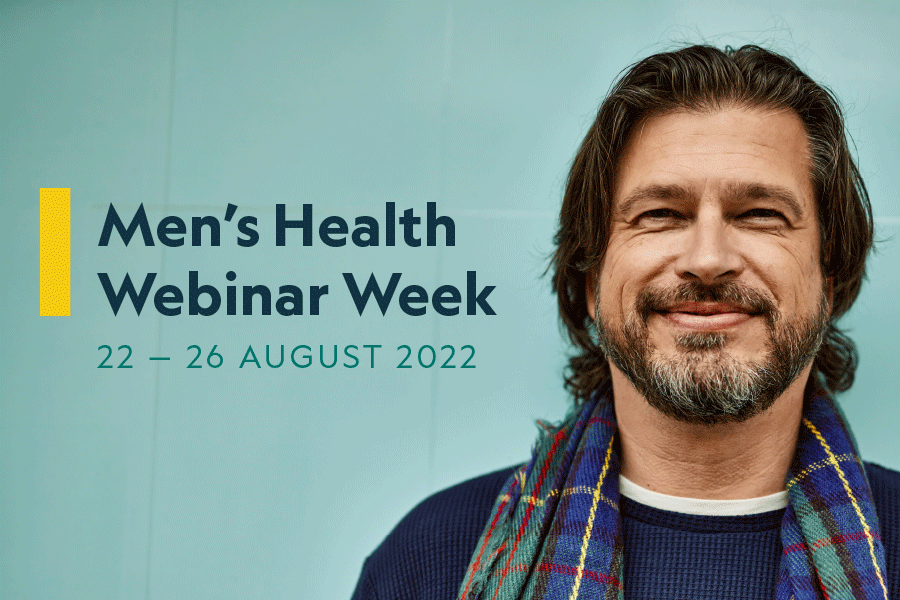Healthy North Coast is discussing men’s health over 5 days of informative lunchtime webinars this August.
Join us over 5 days from 1:15pm – 1:55pm when 5 different speakers will talk 5 different health concerns for men. Click here to register for the series — you only need to register once and we’ll send you the links to join the webinars that interest you.
Short, sharp and informative, we invite you to grab some lunch and learn more about these important men’s health issues. Each webinar is accredited for 1 CPD point with RACGP.
Click on the dates below to find out more about each session and speakers.
Prostate cancer is the most common cancer diagnosed in Australian men. Despite a high survival rate, patients often report poor quality of life related to treatment side effects.
Clinicians can improve their patients’ experience and outcomes by being aware of risk factors, informing and assisting men with their decision regarding PSA testing, knowing which symptoms to investigate further, and by understanding management options and supportive care needs.
Presented by: Dr Lisa Osgood, Urologist, St Vincents Hospital, Lismore.
Erectile dysfunction is a common but often neglected condition. Prevalence increases with age, but it is not insignificant in younger men.
Erectile dysfunction may be classified as vasculogenic, neurogenic, endocrinological, drug-related, psychogenic or mixed. Commonly, erectile dysfunction is a cause of anxiety and depression.
Risk factors, such as smoking and hypertension, and reversible causes, such as hypogonadism or offending medications, should be addressed.
Presented by: Dr Alistair Campbell, Specialist Urologist, John Flynn Private Hospital and the Erectile Dysfunction Clinic.
Subfertility effects one in 20 men. Idiopathic oligoasthenoteratozoospermia is the most common cause, while other types of subfertility are caused by testicular or genital tract infection, disease, or abnormalities.
Systemic disease, external factors (such as drugs, lifestyle, etc), or combinations of these also result in male subfertility.
This webinar explores risk factors, causes, diagnosis, treatment and referral options.
Presented by: Dr Frank Quinn, Fertility Specialist, North Shore Specialist Day Hospital and Men’s Fertility Clinic, IVF Australia.
Lower urinary tract symptoms (LUTS) affect men of all ages but are most common among elderly men. Management can be complex, and although most LUTS could be treated effectively in primary care, referrals to urology outpatients are increasing and have long waitlists.
This webinar will look at physiotherapy intervention for lower urinary tract symptoms, including urinary incontinence and overactive bladders and when it is appropriate to refer.
Presented by: Kate Goswell, Pelvic Floor Physiotherapist.
Becoming a new dad is a life-changing and sometimes bewildering experience. Even when change is positive, it can still be challenging.
Research indicates that around 10% of fathers experience depression and/or anxiety (PNDA) around the time of birth and over half report significantly increased stress levels.
Around 45% of men don’t realise PNDA can affect dads. Having mixed and complex emotions as an expecting or new dad is completely normal, but these can be confronting and confusing emotions to manage.
Presented by: Lucy Frankham, Clinical Psychologist with a special interest in the perinatal period.



